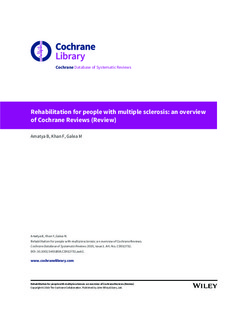| dc.description.abstract | Background
Multiple sclerosis (MS) is a major cause of chronic, neurological disability, with a significant long‐term disability burden, often requiring comprehensive rehabilitation.
Objectives
To systematically evaluate evidence from published Cochrane Reviews of clinical trials to summarise the evidence regarding the effectiveness and safety of rehabilitation interventions for people with MS (pwMS), to improve patient outcomes, and to highlight current gaps in knowledge.
Methods
We searched the Cochrane Database of Systematic Reviews up to December 2017, to identify Cochrane Reviews that assessed the effectiveness of organised rehabilitation interventions for pwMS. Two reviewers independently assessed the quality of included reviews, using the Revised Assessment of Multiple Systematic Reviews (R‐AMSTAR) tool, and the quality of the evidence for reported outcomes, using the GRADE framework.
Main results
Overall, we included 15 reviews published in the Cochrane Library, comprising 164 randomised controlled trials (RCTs) and four controlled clinical trials, with a total of 10,396 participants. The included reviews evaluated a wide range of rehabilitation interventions, including: physical activity and exercise therapy, hyperbaric oxygen therapy (HBOT), whole‐body vibration, occupational therapy, cognitive and psychological interventions, nutritional and dietary supplements, vocational rehabilitation, information provision, telerehabilitation, and interventions for the management of spasticity. We assessed all reviews to be of high to moderate methodological quality, based on R‐AMSTAR criteria.
Moderate‐quality evidence suggested that physical therapeutic modalities (exercise and physical activities) improved functional outcomes (mobility, muscular strength), reduced impairment (fatigue), and improved participation (quality of life). Moderate‐quality evidence suggested that inpatient or outpatient multidisciplinary rehabilitation programmes led to longer‐term gains at the levels of activity and participation, and interventions that provided information improved patient knowledge. Low‐qualitty evidence suggested that neuropsychological interventions, symptom‐management programmes (spasticity), whole body vibration, and telerehabilitation improved some patient outcomes. Evidence for other rehabilitation modalities was inconclusive, due to lack of robust studies.
Authors' conclusions
The evidence suggests that regular specialist evaluation and follow‐up to assess the needs of patients with all types of MS for appropriate rehabilitation interventions may be of benefit, although the certainty of evidence varies across the different types of interventions evaluated by the reviews. Structured, multidisciplinary rehabilitation programmes and physical therapy (exercise or physical activities) can improve functional outcomes (mobility, muscle strength, aerobic capacity), and quality of life. Overall, the evidence for many rehabilitation interventions should be interpreted cautiously, as the majority of included reviews did not include data from current studies. More studies, with appropriate design, which report the type and intensity of modalities and their cost‐effectiveness are needed to address the current gaps in knowledge. | nb_NO |
